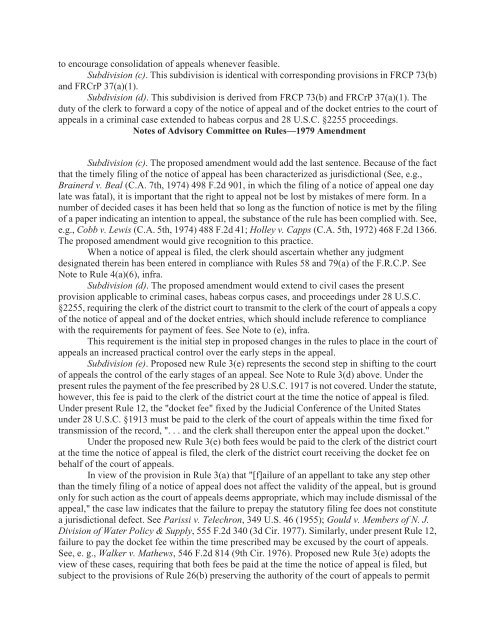Federal Rules of Appellate Procedure 2014-2015, 2014a
Federal Rules of Appellate Procedure 2014-2015, 2014a
Federal Rules of Appellate Procedure 2014-2015, 2014a
Create successful ePaper yourself
Turn your PDF publications into a flip-book with our unique Google optimized e-Paper software.
to encourage consolidation <strong>of</strong> appeals whenever feasible.<br />
Subdivision (c). This subdivision is identical with corresponding provisions in FRCP 73(b)<br />
and FRCrP 37(a)(1).<br />
Subdivision (d). This subdivision is derived from FRCP 73(b) and FRCrP 37(a)(1). The<br />
duty <strong>of</strong> the clerk to forward a copy <strong>of</strong> the notice <strong>of</strong> appeal and <strong>of</strong> the docket entries to the court <strong>of</strong><br />
appeals in a criminal case extended to habeas corpus and 28 U.S.C. §2255 proceedings.<br />
Notes <strong>of</strong> Advisory Committee on <strong>Rules</strong>—1979 Amendment<br />
Subdivision (c). The proposed amendment would add the last sentence. Because <strong>of</strong> the fact<br />
that the timely filing <strong>of</strong> the notice <strong>of</strong> appeal has been characterized as jurisdictional (See, e.g.,<br />
Brainerd v. Beal (C.A. 7th, 1974) 498 F.2d 901, in which the filing <strong>of</strong> a notice <strong>of</strong> appeal one day<br />
late was fatal), it is important that the right to appeal not be lost by mistakes <strong>of</strong> mere form. In a<br />
number <strong>of</strong> decided cases it has been held that so long as the function <strong>of</strong> notice is met by the filing<br />
<strong>of</strong> a paper indicating an intention to appeal, the substance <strong>of</strong> the rule has been complied with. See,<br />
e.g., Cobb v. Lewis (C.A. 5th, 1974) 488 F.2d 41; Holley v. Capps (C.A. 5th, 1972) 468 F.2d 1366.<br />
The proposed amendment would give recognition to this practice.<br />
When a notice <strong>of</strong> appeal is filed, the clerk should ascertain whether any judgment<br />
designated therein has been entered in compliance with <strong>Rules</strong> 58 and 79(a) <strong>of</strong> the F.R.C.P. See<br />
Note to Rule 4(a)(6), infra.<br />
Subdivision (d). The proposed amendment would extend to civil cases the present<br />
provision applicable to criminal cases, habeas corpus cases, and proceedings under 28 U.S.C.<br />
§2255, requiring the clerk <strong>of</strong> the district court to transmit to the clerk <strong>of</strong> the court <strong>of</strong> appeals a copy<br />
<strong>of</strong> the notice <strong>of</strong> appeal and <strong>of</strong> the docket entries, which should include reference to compliance<br />
with the requirements for payment <strong>of</strong> fees. See Note to (e), infra.<br />
This requirement is the initial step in proposed changes in the rules to place in the court <strong>of</strong><br />
appeals an increased practical control over the early steps in the appeal.<br />
Subdivision (e). Proposed new Rule 3(e) represents the second step in shifting to the court<br />
<strong>of</strong> appeals the control <strong>of</strong> the early stages <strong>of</strong> an appeal. See Note to Rule 3(d) above. Under the<br />
present rules the payment <strong>of</strong> the fee prescribed by 28 U.S.C. 1917 is not covered. Under the statute,<br />
however, this fee is paid to the clerk <strong>of</strong> the district court at the time the notice <strong>of</strong> appeal is filed.<br />
Under present Rule 12, the "docket fee" fixed by the Judicial Conference <strong>of</strong> the United States<br />
under 28 U.S.C. §1913 must be paid to the clerk <strong>of</strong> the court <strong>of</strong> appeals within the time fixed for<br />
transmission <strong>of</strong> the record, ". . . and the clerk shall thereupon enter the appeal upon the docket."<br />
Under the proposed new Rule 3(e) both fees would be paid to the clerk <strong>of</strong> the district court<br />
at the time the notice <strong>of</strong> appeal is filed, the clerk <strong>of</strong> the district court receiving the docket fee on<br />
behalf <strong>of</strong> the court <strong>of</strong> appeals.<br />
In view <strong>of</strong> the provision in Rule 3(a) that "[f]ailure <strong>of</strong> an appellant to take any step other<br />
than the timely filing <strong>of</strong> a notice <strong>of</strong> appeal does not affect the validity <strong>of</strong> the appeal, but is ground<br />
only for such action as the court <strong>of</strong> appeals deems appropriate, which may include dismissal <strong>of</strong> the<br />
appeal," the case law indicates that the failure to prepay the statutory filing fee does not constitute<br />
a jurisdictional defect. See Parissi v. Telechron, 349 U.S. 46 (1955); Gould v. Members <strong>of</strong> N. J.<br />
Division <strong>of</strong> Water Policy & Supply, 555 F.2d 340 (3d Cir. 1977). Similarly, under present Rule 12,<br />
failure to pay the docket fee within the time prescribed may be excused by the court <strong>of</strong> appeals.<br />
See, e. g., Walker v. Mathews, 546 F.2d 814 (9th Cir. 1976). Proposed new Rule 3(e) adopts the<br />
view <strong>of</strong> these cases, requiring that both fees be paid at the time the notice <strong>of</strong> appeal is filed, but<br />
subject to the provisions <strong>of</strong> Rule 26(b) preserving the authority <strong>of</strong> the court <strong>of</strong> appeals to permit


















